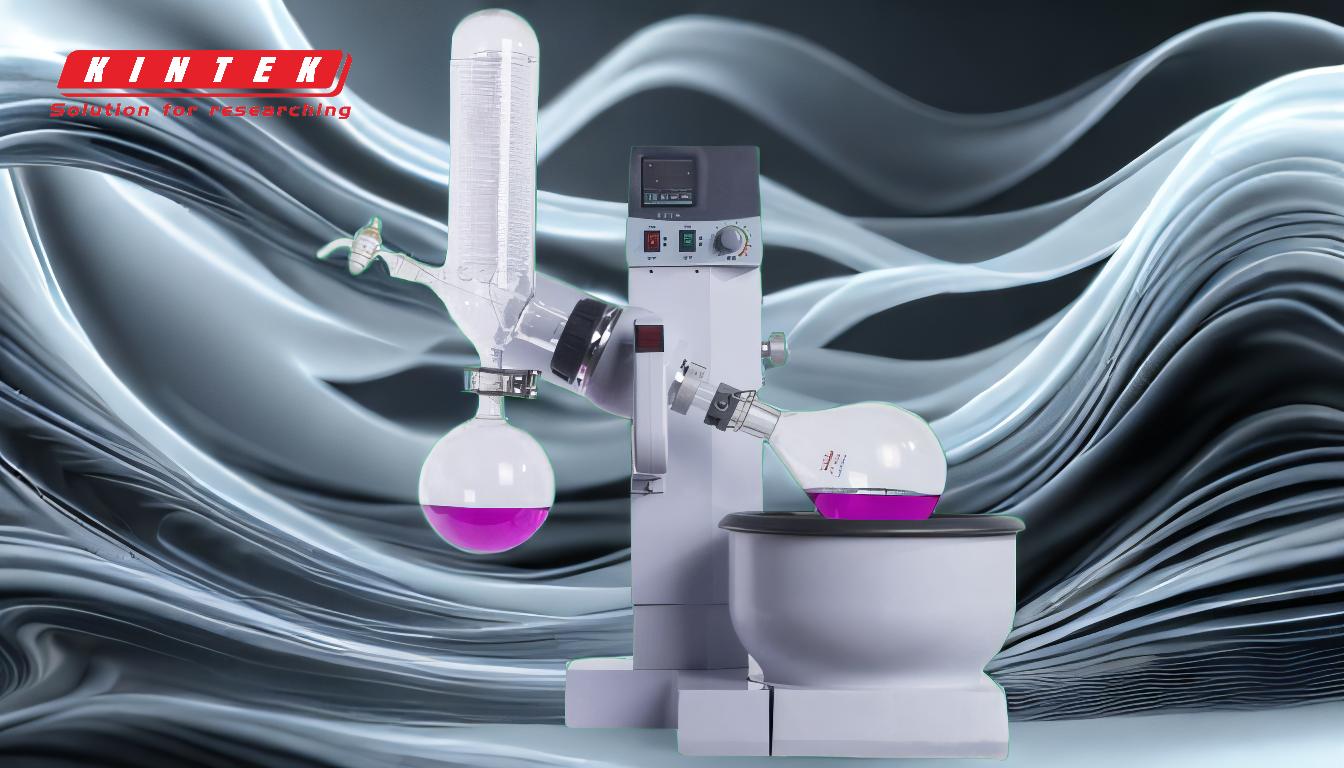Rotary evaporation distillation has a wider application due to its unique design and operational advantages, which make it more efficient, versatile, and user-friendly compared to traditional distillation methods. Key factors include lower boiling temperatures under reduced pressure, faster evaporation rates due to increased surface area and constant rotation, and reduced risk of thermal degradation. These features make rotary evaporators suitable for sensitive materials, such as biological products, and enable their use in various fields like concentration, crystallization, drying, separation, and solvent recovery. Additionally, rotary evaporators are energy-efficient, compact, and designed to minimize manual operations, making them ideal for both laboratory and industrial settings.
Key Points Explained:

-
Lower Boiling Temperatures Under Reduced Pressure:
- Rotary evaporators operate under reduced pressure, which lowers the boiling point of solvents. This is particularly beneficial for heat-sensitive materials, such as biological products, as it minimizes the risk of thermal degradation.
- The reduced pressure also allows for the evaporation of solvents with lower boiling points, making the process more efficient and versatile.
-
Faster Evaporation Rates:
- The constant rotation of the flask creates a thin film of liquid on the inner surface, significantly increasing the surface area for evaporation. This leads to faster distillation rates compared to traditional methods.
- The rotation also helps suppress bumping, which is the sudden, violent boiling that can lead to sample loss or contamination.
-
Energy Efficiency and Reduced Thermal Degradation:
- Rotary evaporators are designed to operate at lower temperatures, which not only conserves energy but also reduces the risk of damaging heat-sensitive compounds.
- The efficient cooling system, typically using a high-efficiency glass condenser, ensures that solvent vapors are rapidly condensed and recycled, further enhancing energy efficiency.
-
Versatility in Applications:
- Rotary evaporators are used in a wide range of applications, including concentration, crystallization, drying, separation, and solvent recovery. This versatility makes them indispensable in various fields, from pharmaceuticals to food processing.
- They are particularly suitable for the purification and concentration of biological products, which require gentle handling and precise temperature control.
-
User-Friendly Design:
- The built-in motors and automated features reduce the need for manual operations, making rotary evaporators accessible even to inexperienced users.
- The compact structure, ease of observation, and leakproof design further enhance their usability and reliability.
-
Improved Safety and Sample Integrity:
- The suppression of bumping and the formation of a thin liquid film during rotation help maintain sample integrity by preventing sudden bursts or violent boiling.
- This feature is especially important when working with valuable or sensitive materials, as it minimizes the risk of contamination or loss.
-
Cost-Effectiveness and Environmental Benefits:
- Rotary evaporators are more energy-efficient than traditional boiling methods, reducing operational costs.
- The ability to recycle solvents not only lowers expenses but also reduces environmental impact by minimizing waste.
-
Compact and Modern Design:
- Rotary evaporators are designed to be compact, making them suitable for both laboratory and production environments.
- Modern designs include improvements in appearance and humanization, such as ergonomic controls and enhanced safety features, making them more user-friendly and aesthetically pleasing.
In summary, the widespread application of rotary evaporation distillation is due to its efficiency, versatility, and user-friendly design. These features make it an essential tool in various scientific and industrial processes, particularly for handling heat-sensitive materials and achieving rapid, reliable results.
Summary Table:
| Feature | Advantage |
|---|---|
| Lower Boiling Temperatures | Reduces thermal degradation, ideal for heat-sensitive materials. |
| Faster Evaporation Rates | Increased surface area and rotation speed up distillation. |
| Energy Efficiency | Operates at lower temperatures, conserving energy and reducing costs. |
| Versatility | Suitable for concentration, crystallization, drying, and solvent recovery. |
| User-Friendly Design | Compact, automated, and easy to use, even for beginners. |
| Improved Safety | Prevents bumping and maintains sample integrity. |
| Cost-Effectiveness | Recycles solvents, lowering expenses and environmental impact. |
| Compact and Modern Design | Fits well in labs and industrial settings with ergonomic features. |
Ready to enhance your lab's efficiency? Contact us today to explore rotary evaporators!










